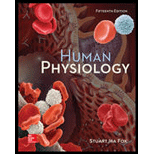
Human Physiology
15th Edition
ISBN: 9781259864629
Author: Fox, Stuart Ira
Publisher: Mcgraw-hill Education,
expand_more
expand_more
format_list_bulleted
Question
Chapter 19, Problem 13aCP
Summary Introduction
To review:
The effects of growth hormone on the
Introduction:
Growth hormone is secreted by the anterior pituitary gland. In growing years, growth hormone is important as it contributes to an increase in the skeletal growth as well as mass in the soft tissues. During fasting and absorption, this hormone shows both anabolic and catabolic effects.
Expert Solution & Answer
Want to see the full answer?
Check out a sample textbook solution
Students have asked these similar questions
glg 112 mid unit assignment Identifying melting processes
Give only the mode of inheritance consistent with all three pedigrees and only two reasons that support this, nothing more, (it shouldn't take too long)
O
Chapter 19 Solutions
Human Physiology
Ch. 19 - Explain how the metabolic rate is influenced by...Ch. 19 - Prob. 2aCPCh. 19 - Prob. 2bCPCh. 19 - Prob. 3CPCh. 19 - Distinguish between the energy reserves and...Ch. 19 - Prob. 5CPCh. 19 - Identify the brain regions involved in hunger and...Ch. 19 - Prob. 7CPCh. 19 - Describe how the secretions of insulin and...Ch. 19 - Prob. 8bCP
Ch. 19 - Define the following terms: glycogenolysis,...Ch. 19 - Prob. 9CPCh. 19 - Prob. 10aCPCh. 19 - Prob. 10bCPCh. 19 - Explain the meaning of the terms insulin...Ch. 19 - Prob. 12aCPCh. 19 - Prob. 12bCPCh. 19 - Prob. 13aCPCh. 19 - Prob. 13bCPCh. 19 - Describe the mechanisms by which the secretion of...Ch. 19 - Prob. 15aCPCh. 19 - Prob. 15bCPCh. 19 - Prob. 15cCPCh. 19 - ln questions 1-5, match the item to the correct...Ch. 19 - Prob. 2RACh. 19 - Prob. 3RACh. 19 - Prob. 4RACh. 19 - Prob. 5RACh. 19 - Prob. 6RACh. 19 - Prob. 7RACh. 19 - Prob. 8RACh. 19 - Prob. 9RACh. 19 - The increased intestinal absorption of calcium is...Ch. 19 - Prob. 11RACh. 19 - Prob. 12RACh. 19 - Prob. 13RACh. 19 - Prob. 14RACh. 19 - Prob. 15RACh. 19 - Prob. 16RACh. 19 - Prob. 17RACh. 19 - Prob. 18RACh. 19 - Prob. 19RACh. 19 - Prob. 20RACh. 19 - Prob. 21RACh. 19 - Prob. 22RACh. 19 - Prob. 23RACh. 19 - Prob. 24RACh. 19 - Prob. 25RACh. 19 - Prob. 26RACh. 19 - Prob. 27RACh. 19 - Describe the conditions of gigantism, acromegaly,...Ch. 19 - Describe how hormones secreted by the...Ch. 19 - Prob. 30RACh. 19 - Prob. 31RACh. 19 - Prob. 32RACh. 19 - Prob. 33RACh. 19 - Prob. 34RACh. 19 - Prob. 35RACh. 19 - Prob. 36RACh. 19 - Prob. 37RACh. 19 - Prob. 38RACh. 19 - Prob. 39RACh. 19 - Prob. 40RACh. 19 - Prob. 41RACh. 19 - Prob. 42RACh. 19 - Prob. 43RA
Knowledge Booster
Learn more about
Need a deep-dive on the concept behind this application? Look no further. Learn more about this topic, biology and related others by exploring similar questions and additional content below.Similar questions
- Describe the principle of homeostasis.arrow_forwardExplain how the hormones of the glands listed below travel around the body to target organs and tissues : Pituitary gland Hypothalamus Thyroid Parathyroid Adrenal Pineal Pancreas(islets of langerhans) Gonads (testes and ovaries) Placentaarrow_forwardWhat are the functions of the hormones produced in the glands listed below: Pituitary gland Hypothalamus Thyroid Parathyroid Adrenal Pineal Pancreas(islets of langerhans) Gonads (testes and ovaries) Placentaarrow_forward
- Describe the hormones produced in the glands listed below: Pituitary gland Hypothalamus Thyroid Parathyroid Adrenal Pineal Pancreas(islets of langerhans) Gonads (testes and ovaries) Placentaarrow_forwardPlease help me calculate drug dosage from the following information: Patient weight: 35 pounds, so 15.9 kilograms (got this by dividing 35 pounds by 2.2 kilograms) Drug dose: 0.05mg/kg Drug concentration: 2mg/mLarrow_forwardA 25-year-old woman presents to the emergency department with a 2-day history of fever, chills, severe headache, and confusion. She recently returned from a trip to sub-Saharan Africa, where she did not take malaria prophylaxis. On examination, she is febrile (39.8°C/103.6°F) and hypotensive. Laboratory studies reveal hemoglobin of 8.0 g/dL, platelet count of 50,000/μL, and evidence of hemoglobinuria. A peripheral blood smear shows ring forms and banana-shaped gametocytes. Which of the following Plasmodium species is most likely responsible for her severe symptoms? A. Plasmodium vivax B. Plasmodium ovale C. Plasmodium malariae D. Plasmodium falciparumarrow_forward
- please fill in missing parts , thank youarrow_forwardplease draw in the answers, thank youarrow_forwarda. On this first grid, assume that the DNA and RNA templates are read left to right. DNA DNA mRNA codon tRNA anticodon polypeptide _strand strand C с A T G A U G C A TRP b. Now do this AGAIN assuming that the DNA and RNA templates are read right to left. DNA DNA strand strand C mRNA codon tRNA anticodon polypeptide 0 A T G A U G с A TRParrow_forward
arrow_back_ios
SEE MORE QUESTIONS
arrow_forward_ios
Recommended textbooks for you
 Human Physiology: From Cells to Systems (MindTap ...BiologyISBN:9781285866932Author:Lauralee SherwoodPublisher:Cengage LearningEssentials of Pharmacology for Health ProfessionsNursingISBN:9781305441620Author:WOODROWPublisher:Cengage
Human Physiology: From Cells to Systems (MindTap ...BiologyISBN:9781285866932Author:Lauralee SherwoodPublisher:Cengage LearningEssentials of Pharmacology for Health ProfessionsNursingISBN:9781305441620Author:WOODROWPublisher:Cengage Comprehensive Medical Assisting: Administrative a...NursingISBN:9781305964792Author:Wilburta Q. Lindh, Carol D. Tamparo, Barbara M. Dahl, Julie Morris, Cindy CorreaPublisher:Cengage Learning
Comprehensive Medical Assisting: Administrative a...NursingISBN:9781305964792Author:Wilburta Q. Lindh, Carol D. Tamparo, Barbara M. Dahl, Julie Morris, Cindy CorreaPublisher:Cengage Learning Medical Terminology for Health Professions, Spira...Health & NutritionISBN:9781305634350Author:Ann Ehrlich, Carol L. Schroeder, Laura Ehrlich, Katrina A. SchroederPublisher:Cengage Learning
Medical Terminology for Health Professions, Spira...Health & NutritionISBN:9781305634350Author:Ann Ehrlich, Carol L. Schroeder, Laura Ehrlich, Katrina A. SchroederPublisher:Cengage Learning

Human Physiology: From Cells to Systems (MindTap ...
Biology
ISBN:9781285866932
Author:Lauralee Sherwood
Publisher:Cengage Learning


Essentials of Pharmacology for Health Professions
Nursing
ISBN:9781305441620
Author:WOODROW
Publisher:Cengage

Comprehensive Medical Assisting: Administrative a...
Nursing
ISBN:9781305964792
Author:Wilburta Q. Lindh, Carol D. Tamparo, Barbara M. Dahl, Julie Morris, Cindy Correa
Publisher:Cengage Learning

Medical Terminology for Health Professions, Spira...
Health & Nutrition
ISBN:9781305634350
Author:Ann Ehrlich, Carol L. Schroeder, Laura Ehrlich, Katrina A. Schroeder
Publisher:Cengage Learning

What is Metabolism?; Author: Stated Clearly;https://www.youtube.com/watch?v=nRq6N5NGD1U;License: Standard youtube license